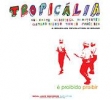Tropicalia
There is no disputing that we live in an extremely wasteful and disposable society and this is as evident in the media as the other branches of society. With more and more sources of media, the lifespan of the average item grows increasingly short. If a TV show doesn’t gain a following in its first couple of weeks, it is cancelled. If a movie fails to pull in crowds on its first weekend in the US, the studio will write it off as a lost cause and not waste another dime promoting it. If a song or album doesn’t make it into the collective consciousness in its brief moment in the sun, it will be immediately forgotten. This pattern is only very loosely correlated with the quality of the show/music/movie.
With this in mind, it is something that I have always been proud of that my music collection contains few albums released before I got into music in about 1997, and almost all of those being the early albums of bands whose post-97 albums I have enjoyed. My theory is that the millennium of written and the century of recorded music that survives thanks to our forebears’ providence will just have to wait while there is such a plethora of brilliant music being created right now that could vanish in a puff of smoke at any instant. But rules are made to be broken and after reading half a dozen reviews raving about the compilation album Tropicalia: A Brazilian Revolution in Sound I had to give it a listen — and boy am I glad I did.
Tropicalia was a Brazilian art movement which lasted little more than the year of 1968. At its core was a small collective of musicians but it also encompassed cinema, theatre and poetry with a strong political current through it all. Indeed it was this perceived subversiveness which upset Brazil’s military dictatorship and led to the arrest, imprisonment and deportation of two of the movement’s leading lights — Caetano Veloso and Gilberto Gil — bringing the movement to an abrupt end.
Anyway, enough history. How does the music sound? Brilliant. At its core is the kind of psychedelic pop and rock that was coming out of the UK and US at the time, the Beatles’ Sgt. Pepper having been released in the middle of 1967. But this is just one ingredient in the mix. What makes this music so fresh and different (unlike much of the other psychedelic music of the day which to the modern ear can sound fairly one dimensional and tired) is everything else that is thrown into the pot. And given that Tropicalia was a movement defined more by the philosophy of its practitioners than the style of the music, this can be pretty much anything from experimental and avant garde music to Brazilian folk and Bossa Nova. Throughout there is a joyfulness which is magically infectious combined with an experimentation that means there is always a surprise around the corner. There is not an uninteresting track on the album while at the same time no two sound the same (even the two versions of the same song, Bat Macumba, which open and close the album). Gal Costa’s Tuareg combines bossa nova rhythms with middle eastern sounds to wonderful effect. Irene, the vocals of which were recorded by Caetano Veloso while in jail is a sparser track with acoustic guitar and flute. The album veers more towards traditional bossa nova on Jorge Ben’s Take it Easy, My Brother Charles which is impossible to hear without clicking your fingers along to its infectious beat, horns, whistle and backing singers. Tom Ze’s tracks are a little slower with a somewhat menacing sense of melodrama created by a soaring horn accompaniment. However it is the tracks of Os Mutantes which really stand out with the band one moment playing Mamas and the Papas style summery pop, a moment later they are immersed in a mess of distortion and fuzz guitars with plenty of outright experimentation and classic ’60s organ solos in between. The philosophical connection with many of the bands I love today for creating innovative new music by combining the best of rock, hip-hop and electronica is undeniable.
That all this wonderfully innovative work was produced of a small collective of artists living under a dictatorship over such a short time is amazing. Sure, there will be dozens of great artists whose work I will miss out on hearing over the coming months while I obsess over the nearly 40 year old work of these Brazilian musicians but it is a price more than worth paying.
850
Tom
July 4th, 2006 at 7:51 pm
I do my best work in dictatorships.
I know someone with almost the opposite view to you. He refuses to touch anything from the last 100 years (literature though, not necessarily music) because it hasn’t yet been filtered into ‘classics’ and ‘crap’. He only tries things if they’ve endured.
I can identify more with your philosophy!